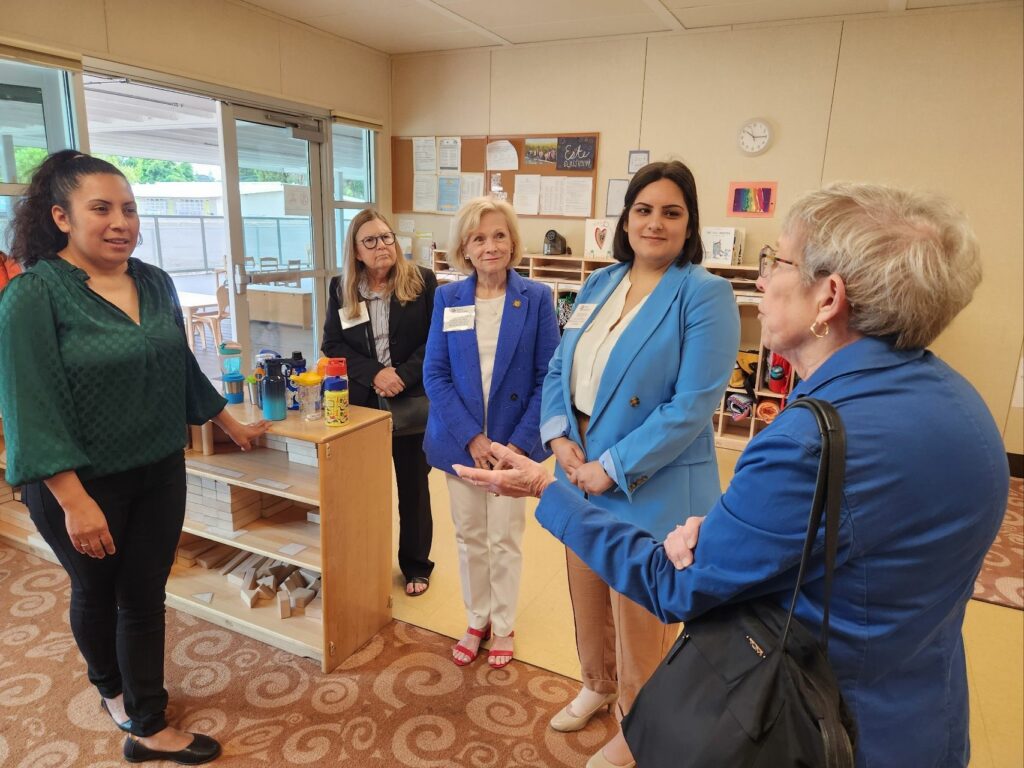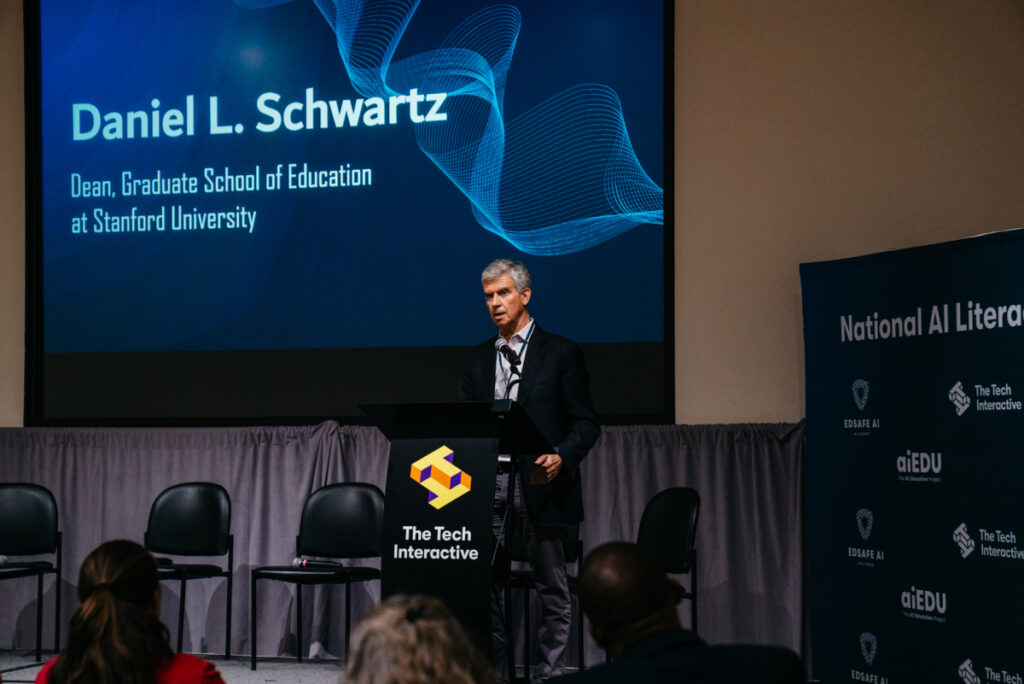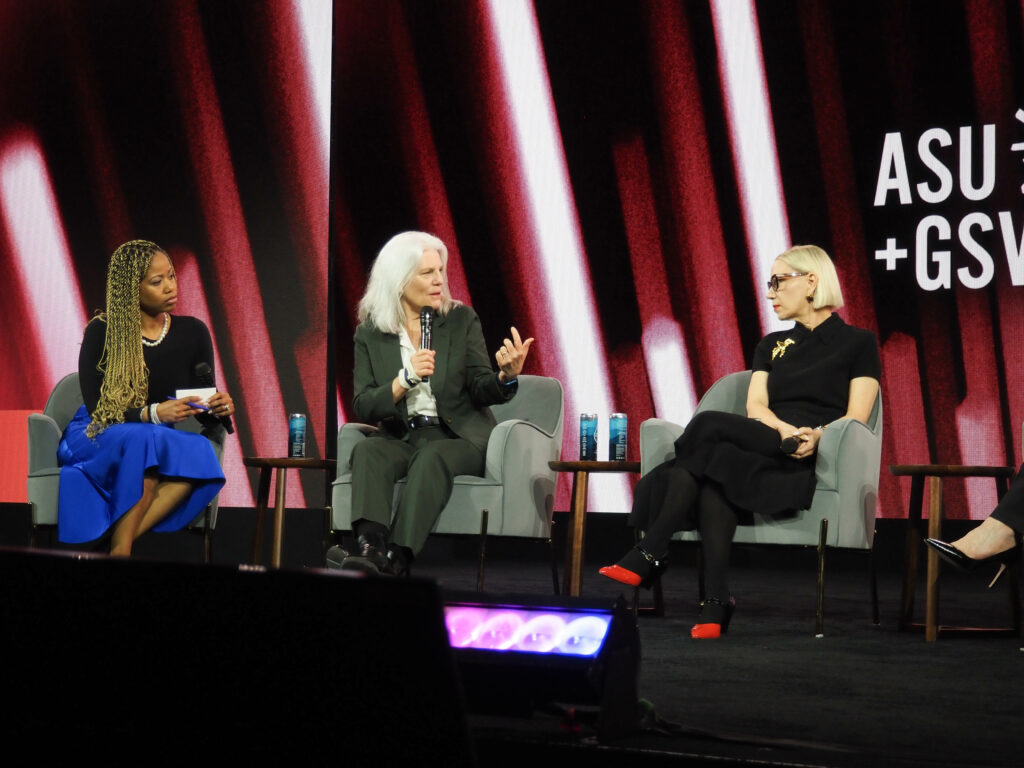Last week more than a dozen policy leaders from across the country gathered at Stanford to take part in The Hunt Institute’s 2023 Early Childhood Policy Academy, a training aimed at educating and empowering leaders to support early education and care in their regions.
The Stanford Center on Early Childhood, an initiative of the Stanford Accelerator for Learning, hosted this year’s event in collaboration with The Hunt Institute, a nonprofit dedicated to informing policymakers about educational issues.
The kick-off
State leaders boarded a bus on an overcast Friday morning for the official kick-off – to see Menlo Park’s All Five school in action. All Five is an early education and care center focused on giving all families, regardless of income, access to high-quality care and education.

Teachers gave attendees a guided tour of the center, where 75% of children, who range from six weeks to five years, come from low-income families who pay little to no tuition. The rest of the families pay full tuition, and the school closes its budget gap with philanthropic funding.
But All Five founder Carol Thomsen said even with the innovative model, her educators still don’t get paid enough.
“I think we’re at the bottom of the bottom or even lower in terms of status and in terms of pay than pretty much anyone else in the country,” Thomsen said about child care workers.
Dr. Reshma Thadani, a doctor at the Ravenswood Family Health Center and assistant of pediatrics at the Stanford University School of Medicine, also discussed All Five's partnership with the health center. The center provides health care, but also resources for families, such as diapers and early literacy materials.
Supporting the early childhood workforce
Back at Stanford, attendees heard from an expert panel on how to support the critical early childhood care and learning workforce.
The majority of child care workers are women of color, and many are immigrants, said Anna Powell, a Senior Researcher and Policy Analyst at the Center for the Study of Child Care Employment at the University of California Berkeley. Half speak a language besides English, and over a third of providers in home-based settings have a bachelor’s degree or higher. In center-based settings, that rises to half. Yet, average national pay for a provider is at $13.71 for a child care provider and $16.99 for a preschool teacher, she said.

“What they ultimately want from us is to see them for what they are, which is these highly skilled professionals doing incredibly challenging and complex labor, instead of being seen as babysitters,” Powell said.
What the RAPID Survey Project tells us about America’s early childhood workforce
Attendees also learned about the RAPID Survey Project from Stanford Center on Early Childhood Director Philip Fisher, and RAPID Director Cristi Carman.
The online survey is a project at the Center on Early Childhood that provides ongoing real-time data about the lives of caregivers and families with young children across the United States, focusing on material hardship, well-being and the impact of policies and programs.

Carman said RAPID was created with the idea “that there would be a need to put that timely ongoing data in the hands of people who could act on it as they were trying to make decisions about how to address those concerns and those experiences through policies, programs and services.”
RAPID is also expanding its surveys to individual cities and counties with the Community Voices Project, which can give policymakers targeted knowledge of the specific needs of their own communities.
Fisher said of the Center on Early Childhood: “We are fundamentally outwardly facing in our work, and we see the potential for impact as having a seat at the table where there are certain tools and knowledge we can bring to work collaboratively to solve issues in early childhood.”
Building a comprehensive early childhood workforce through governance
During another panel, leaders of early childhood departments in several states discussed the innovative approaches and challenges it took to get their systems off the ground.

“We are a new agency,” said Alyssa Chaterjee, the Early Learning System director for the Oregon Early Learning Division. “[But] it does not happen overnight. It's a lot of work and there are a lot of intricacies. You think you have a really good plan on paper and then you start doing it and you realize, wow, you need way more.”
Policy leaders also asked questions and heard from experts about early childhood financing.
“The market itself is broken,” said Theresa Howley, executive director for Early Learning Funding Equity. “Most families, not a subset of families, but almost all families, can't actually afford what it would cost to run a high-quality program with salaries that are going to be competitive in today's marketplace for the skills they bring to the table.”
Kenny Francis, director of Coaching and Capacity for the Children’s Funding Project, said fiscal mapping is key to understanding how early childhood programs can be funded, but it’s not easy.

“Most of you might be surprised to learn that there isn't a simple place you can go and look at all the federal funding streams that are supporting children and youth in your community,” he told attendees. “And if it's hard to do that in your state budget, it's often even harder to do that at the local level.”
Francis said the Children’s Funding Project is working on an online tool that will make searching for these streams of funding much easier.
Technology in early childhood contexts
Stanford Accelerator for Learning Executive Director Isabelle Hau moderated the closing panel on technology and AI in childhood contexts.
“Technology in particular is designed to fire the reward center in your brain,” said Kris Perry, executive director of Children and Screens. “If you're two, three, four or five, and you learn that feeling at a young age, it's very hard to focus on people or other activities. My core belief is that the longer we can preserve and protect the human relationship, because love accelerates learning, the better our kids will do.”

Victor Lee, associate professor at Stanford and faculty lead for AI+Education at the Stanford Accelerator for Learning, said technology isn’t all bad, as long as it is used to amplify teachings, and not replace human interaction.
“As a technologist, there are things that I'm enthusiastic about,” he said, “Where it can make it possible for kids who do not have a chance to talk with one another, or connect with one another, to connect with and through the technology. So that is fantastic.”
Empowered to take action
Closing out the academy was Dan Wuori, senior director of Early Learning at The Hunt Institute, who emphasized the brokenness of the early childhood system in the U.S.
“We know that this is a workforce crisis, we know it is a compensation crisis, we know that governance is, frankly, a mess,” he said.
Wuori hoped the academy was a “catalytic conversation,” that empowered policy leaders to be thinking about how they can take action.
“What is my role?” he asked attendees to consider. “In my own sphere of influence, now that I have this knowledge, what are we going to do about it?”

This story was originally published by the Stanford Center on Early Childhood here.



